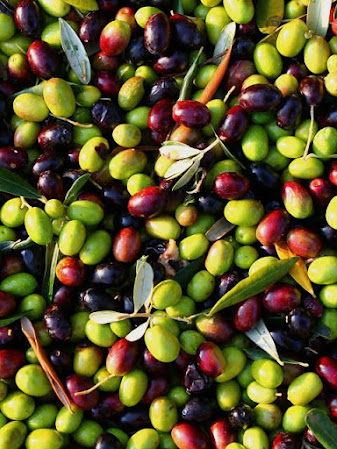Description :
Olive trees grow to 3-12 m (10-40 ft) and have many branches. The leaves are leathery and lance-shaped, dark green on top and silver on the lower branches on the other side. Wood is resistant to corrosion. When it dies from above, often a new stem grows from the root.
Olive trees bloom in late spring. Small white flowers bloom on the raceme of the lower leaf. There are two types of flowers. Whole, there are male and female parts that can turn into olives. Men containing only pollen-generating ingredients. Olives are pollinated by the wind. The arrangement of olive berries is often irregular. Intermittent exposure over many years is common in some areas, especially without irrigation or fertilizer. The tree produces a great harvest in one year and may not flower the following year.
Olives are botanically classified as peaches or plums. Rocks have one or two particles. Olives typically contain a maximum oil content (about 20-30% of their fresh weight) and reach their maximum weight 6-8 months after flowering. At this point they turn black and stick to the tree for several weeks.
Nutrition :
100gm Of Olive Contain :
- Calories: 115
- Water: 80%
- Protein: 0.8 grams
- Carbs: 6.3 grams
- Sugar: 0 grams
- Fiber: 3.2 grams
- Fat: 10.7 grams
Vitamin & Minerals :
- Vitamin E
- Vitamin C
- Vitamin A
- Vitamin B6
- Vitamin K
- Niacin
- Iron
- Copper
- Calcium
- Sodium
- Zinc
- Potassium
- Magnessium
Benefits :
Promotes Heart Health :
Olives are rich in oleic acid (monosaturated fatty acid), a major fatty acid, which is known to reduce inflammation, reduce bad cholesterol (LDL) and prevent oxidation of cholesterol. There is some evidence that olives are effective in controlling blood pressure. Olives show the best results for lowering cholesterol and blood pressure, reducing the risk of heart disease. In addition, the high antioxidant content of olives helps maintain heart health.
Olives are rich in vitamins, polyphenols and monosaturated fatty acids that fight inflammation and other diseases. Oleocanthal, an important ingredient in olives, is known to have powerful anti-inflammatory properties that help relieve pain. It inhibits the production of enzymes that cause inflammation and is surprisingly similar to the olive anti-inflammatory drug ibuprofen.
Promotes Healthy Bones :
Osteoporosis is characterized by a decrease in bone strength and may increase the risk of fractures. Studies have shown that the polyphenols in olives prevent bone destruction by increasing the number of osteoblasts (cells that form the matrix for bone formation) and promoting bone health. One of the most powerful antioxidants in olives, hydroxytyrosol play an important role in bone formation and muscle strength, and may help relieve symptoms of osteoporosis.
Prevent Cancer :
The antioxidant properties of olives help reduce the risk of cancer. Studies have shown that the high amounts of oleic acid and antioxidants in olive oil prevent the formation of cancer cells in olive oil. chest, colon, abdomen.
Improving Gut Health :
Olives are a great source of probiotics, useful for maintaining a healthy digestive system. Since olives are fermented foods, they contain a lot of lactic acid bacteria that are good for the gut. In addition, phenolic compounds in olives inhibit the growth of bacteria that cause gastritis. These phenols act as powerful gut bacteria to support gut health.
Olives are known for their healthful properties, and when eaten whole or as a snack, squeezed in healthy cooking oil and eaten as a snack. Among the beneficial compounds in olives:
- Vitamin E is a mineral that transports oxygen to all organs, as well as acts as a powerful antioxidant that scavenges harmful free radicals and prevents oxidation of healthy cells.
- Rich in iron and copper, an important mineral that maintains red blood cells and provides oxygen to all organs, it reduces the risk of heart disease, heart attack and stroke.
- Rich in calcium, it strengthens bones and muscles and improves nerve function.
Improving Blood Circulation :
Vegetable organics rich in olives can increase nitric oxide production and improve blood flow to tissues. It acts as a vasodilator by relaxing blood vessels, regulating blood pressure, and improving erectile function. Olives, which are also rich in iron, provide oxygen to vital organs and keep blood vessels healthy.
Fruits and vegetables with essential nutrients and antioxidants are better absorbed when eaten with healthy fats such as olives. To utilize the powerful botanical properties of vegetables, drizzle a tablespoon of olive oil over salads and vegetables. This reduces the risk of chronic diseases and improves eye and skin health.




